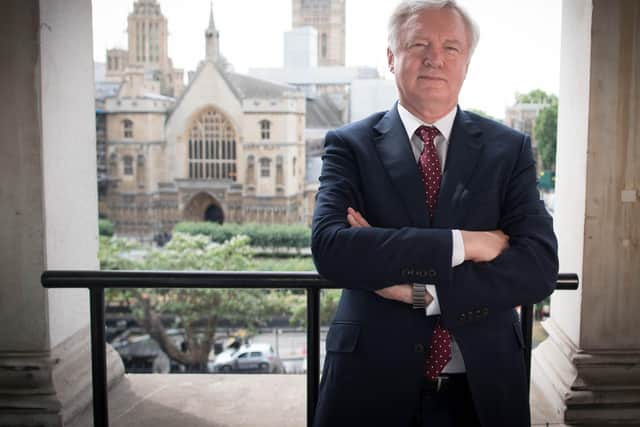We must remember the nurses and care workers who have been hit by the loan charge - Greg Wright
Not my words, but those of a man whose life has been torn apart by the loan charge, a scandal which has brought misery to thousands of law-abiding people who acted on professional advice and had no desire to avoid their responsibilities as taxpayers.
Those affected by the charge include health professionals, who will probably be on the front line in the battle against the coronavirus pandemic.
Advertisement
Hide AdAdvertisement
Hide AdThe scale and complexity of the problems facing those caught up in the loan charge was outlined by David Davis MP in a House of Commons debate.


The loan charge is an anti-avoidance measure introduced in the 2016 Budget to address tax loss from what the Treasury called a variety of “disguised remuneration” schemes.
Mr Davis said many court cases had been unable to decipher the rules surrounding the schemes, adding: “So if the judges can’t understand it, what chance ordinary laymen? People who cannot afford to employ an accountant.
“We’re not talking about city slickers here or international bankers, we’re talking about locum nurses, social workers, care workers and hospital cleaners.”
Advertisement
Hide AdAdvertisement
Hide AdMr Davis said: “These people are now suffering because of a history of poorly drafted regulation and legislation and poor management at HMRC targeted on the wrong people.”
He said instead of chasing individuals HMRC should be going after the advisers who pushed the schemes.
There is overwhelming evidence that the vast majority of people affected by the loan charge were not sophisticated tax dodgers. Far from it.
To quote a report compiled by the Loan Charge All-Party Parliamentary Group: “These arrangements were not entered as aggressive tax avoidance and were often a condition of employment, especially in the public sector.
Advertisement
Hide AdAdvertisement
Hide Ad“A substantial number of people however, especially in the public sector, did not know or understand that their pay arrangements involved loans.”
A review, led by Sir Amyas Morse, confirmed the schemes were a form of tax avoidance but made a series of recommendations about the design of the charge and its impact on those in its scope.
Many people are demanding that the promoters of these schemes must be forced to face the consequences of their actions.
They include a businessman who told me: : “I used the schemes from 2010 to 2015; because HMRC opened enquiries and did nothing about them in all those years, the loan charge review leaves me in exactly the same position as I was in before the review.
Advertisement
Hide AdAdvertisement
Hide Ad“The expectation of HMRC for me to settle without the loan charge applying is greater than £70,000 plus ongoing interest for any repayment schedule.”
The man said that there was no accounting for the 18 per cent of invoice value that was taken by the scheme provider.
At the very least, he believes this should be clawed back from the scheme’s directors and offset against any settlement.
He added: “Even that allows for retrospective claw-back but at least the scheme providers would have been dealt with too.”
Advertisement
Hide AdAdvertisement
Hide AdSpeaking in the Commons, Financial Secretary to the Treasury Jesse Norman said: “I want to put on record again that I and my colleagues recognise the strength of feelings involved, as I’ve said, and very much sympathise with those who may be subject to the charge.”
But he said the schemes discussed were “contrived tax avoidance in which people were paid in the form of loans with no interest and no intention or requirement to pay the loan back”.
HMRC has launched a call for evidence, as part of an initiative to raise standards among those who provide tax advice and services.
Actions against the promoters of these schemes - whose “reprehensible” behaviour was slammed by Sir Amyas Morse - is long overdue.
Advertisement
Hide AdAdvertisement
Hide AdBut what about the locum nurses and health professionals who, as Mr Davis observed, are facing the loan charge?
Surely there is a case for lifting the financial burden from them, as we prepare for the biggest crisis the country has faced in peace time?
Editor’s note: first and foremost - and rarely have I written down these words with more sincerity - I hope this finds you well.
Almost certainly you are here because you value the quality and the integrity of the journalism produced by The Yorkshire Post’s journalists - almost all of which live alongside you in Yorkshire, spending the wages they earn with Yorkshire businesses - who last year took this title to the industry watchdog’s Most Trusted Newspaper in Britain accolade.
Advertisement
Hide AdAdvertisement
Hide AdAnd that is why I must make an urgent request of you: as advertising revenue declines, your support becomes evermore crucial to the maintenance of the journalistic standards expected of The Yorkshire Post. If you can, safely, please buy a paper or take up a subscription. We want to continue to make you proud of Yorkshire’s National Newspaper but we are going to need your help.
Postal subscription copies can be ordered by calling 0330 4030066 or by emailing [email protected]. Vouchers, to be exchanged at retail sales outlets - our newsagents need you, too - can be subscribed to by contacting subscriptions on 0330 1235950 or by visiting www.localsubsplus.co.uk where you should select The Yorkshire Post from the list of titles available.
If you want to help right now, download our tablet app from the App / Play Stores. Every contribution you make helps to provide this county with the best regional journalism in the country.
Sincerely. Thank you.
James Mitchinson
Editor